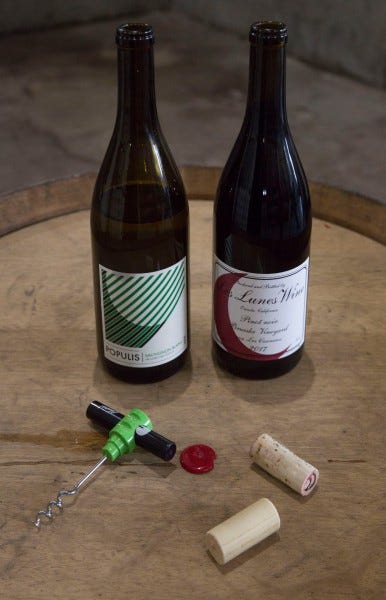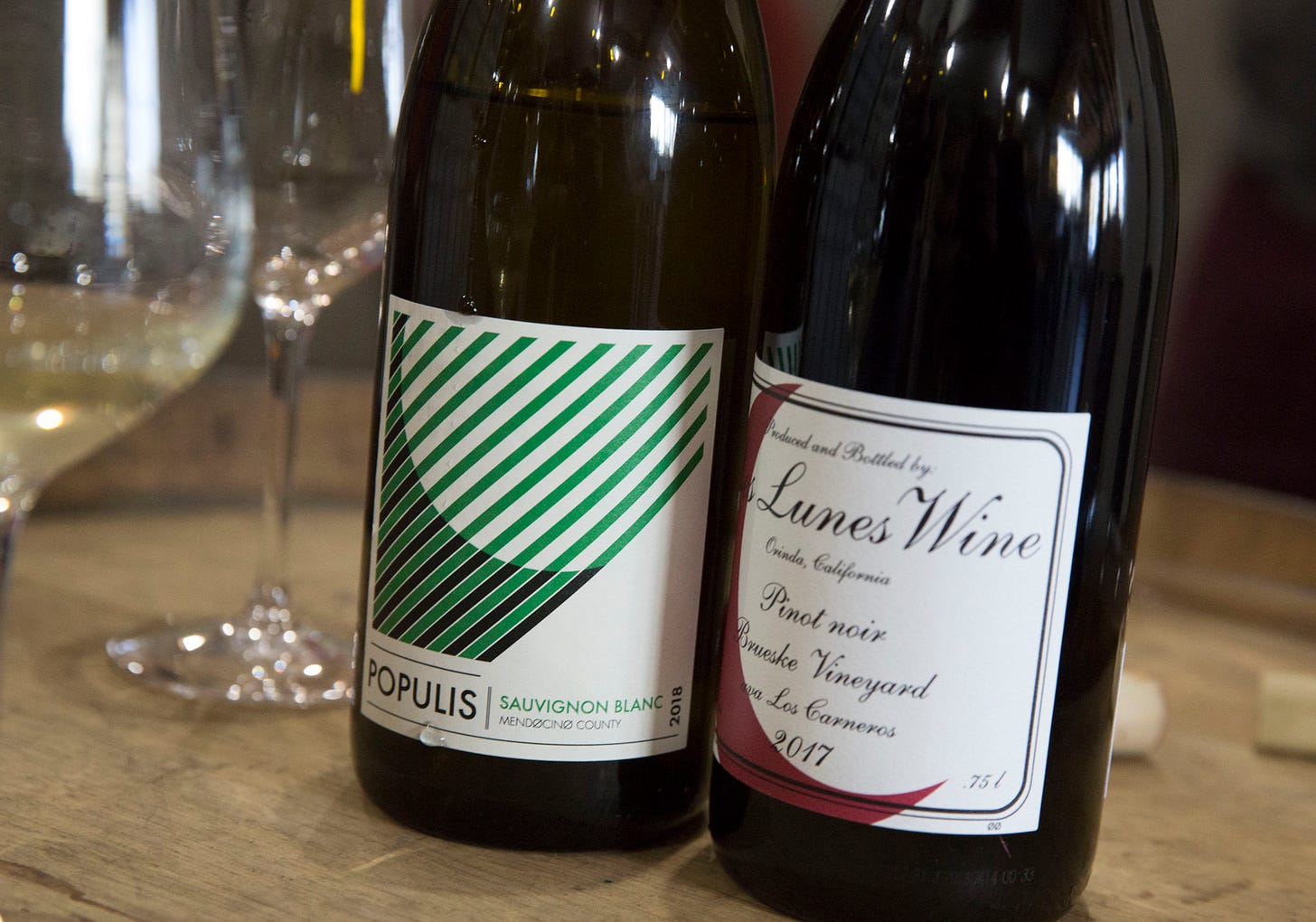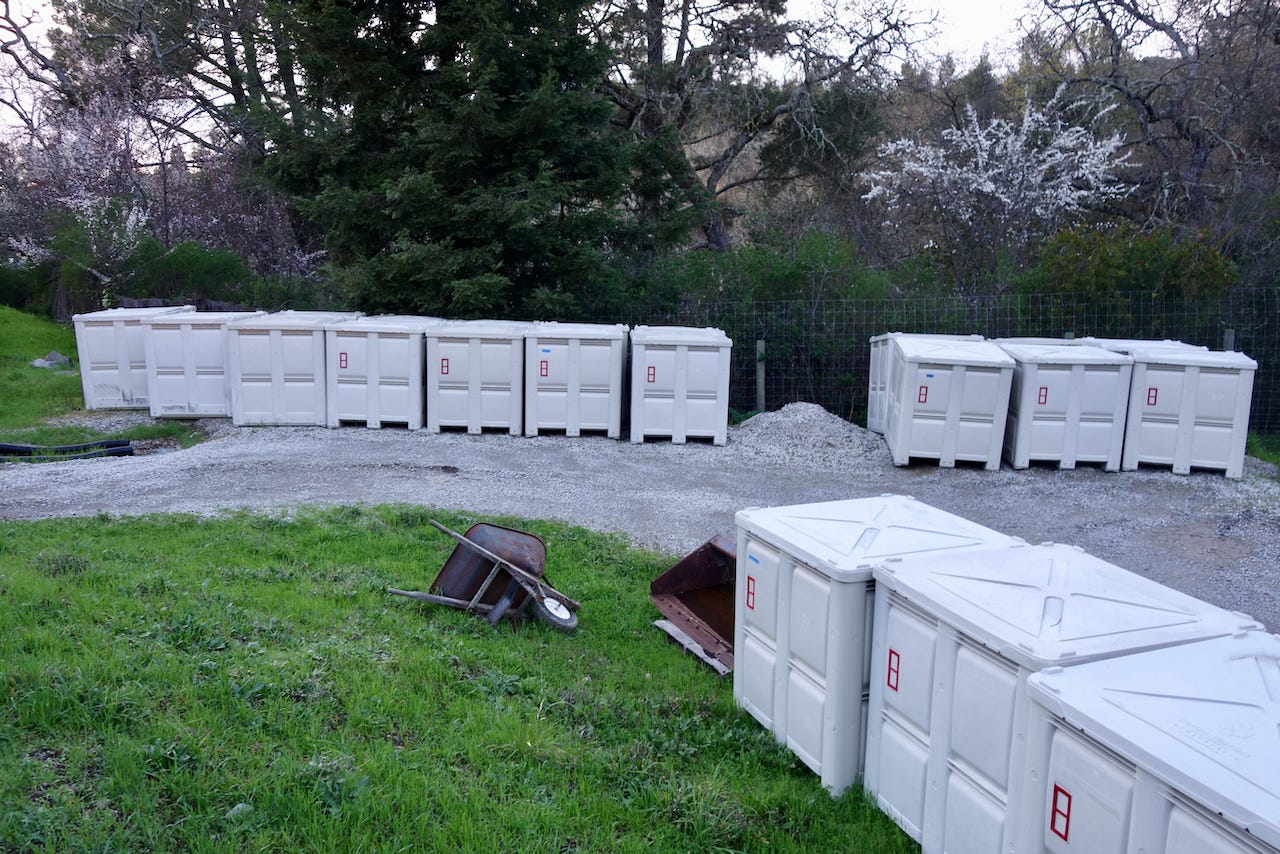CALIFORNIA - Shaunt Oungoulian of Les Lunes / Populis Wine, Orinda
From the start, Les Lunes / Populis' ostensibly simple aim has been to produce natural wine in California.
A few years ago Fleurie winemaker Jules Métras showed me an image on his phone of a bottle of California pinot noir bearing a label strongly reminiscent of that of his father's Fleurie "Ultime": the same flowing cursive script on white background, the same thick diagonal red band, itself reminiscent of Mumm Champagne. Someone had sent the image to Métras, apparently without much explanation, because we just shook our heads and forgot about it. I recalled it this past March, when I visited natural winemaker Shaunt Oungoulian of Les Lunes / Populis Wine at his cellar in Orinda and realized upon arrival that Oungoulian was none other than the producer of that California pinot.
"The first label I did of our pinot was 100-percent just like Yvon's. It was an homage," Oungoulian explains. The labels of his Les Lunes reds have since evolved, the red band now replaced by a red moon. "It was five years ago and his wines were much less known in the US. So it was kind of a wink to the people that could recognise it and understand it."
Oungoulian works from his parents' converted basement in Orinda, California, on a pretty suburban road home to no other commercial activity whatsoever. One recognizes his lawn immediately, for upon it sits a phalanx of plastic fermenting tanks and a heap of marc. It is about as far from the old stone cellars of France as it is possible to imagine. But Oungoulian, a graduate of UC Davis, has significant firsthand experience with his sources of inspiration, having spent the 2013 vinification period in the Beaujolais interning with Julie Balagny, herself a former protégée of Yvon Métras. Before that he'd spent a year a year working with Mâconnais maestro Philippe Valette.
Upon returning to the USA in 2014, Oungoulian partnered with his friends Diego Roig, Sam Baron, and Martha Stoumen to found two wine labels, Populis Wine and Les Lunes. Baron and Stoumen have since moved on to other winemaking projects, leaving Roig and Oungoulian as the faces of Populis / Les Lunes. (I regret not having had the chance to meet Roig during my visit. He's as well-traveled as Oungoulian, having worked at Domaine Leon Barral in the Languedoc and COS in Sicily, among many other estates.)
From the start, Roig and Oungoulian's ostensibly simple aim has been to produce natural wine in California. The ambition of that goal, of course, depends on the rigor of one's definition of natural wine. In Oungoulian and Roig's hands, producing natural wine in California involves creating arrangements to restore the bond between farming and vinification, which is broken or nonexistent in much of the USA.
Oungoulian and Roig produce wine from about 4.5ha of leased vines they farm organically. They also cultivate organically another 4.5ha of vines for others, under vineyard management contracts. In such a way they make money to fund grape purchases from still other organic vineyards. It's a peculiar arrangement, sort of a Rube Goldberg machine in the manner of the Affordable Care Act: an overly complex device that nonetheless results in a net good. Single-payer healthcare would be better, but it is politically unfeasible, in the same way that it would be better if US winemakers were able to possess and farm their own vines, but it is economically unfeasible.
"With the stuff we farm in Napa and Sonoma, the price of the grapes is high, so it kind of makes sense to say, 'Ok let me sell a ton of grapes in Napa and I can go buy three tons in Mendocino,'" says Oungoulian. "It becomes a game of economics."
The pair purchase exclusively organic fruit, which is generally used for the Populis Wine cuvées, which are intended to be easier-drinking, simpler wines, with shorter maceration times and shorter elevage. The Les Lunes label is usually reserved for wines produced from their own leased vineyards, and implies longer macerations, longer elevage, and longer bottle-aging before release. It is a confusing system, presumably dating back to the time when there were four partners in the mix and they had to think in terms of growing to sustain living wages for four accomplished winemakers. Nowadays it seems unnecessary to go to such efforts to distinguish the two "brands"; if anything it sort of devalues the Populis Wine releases, which as often as not are of quite esteemed provenance, thanks to the duo's savvy in developing grape sources.
"Diego is really good at finding weird vineyards by, like, calling everyone," says Oungoulian. "He basically gets the phone book and just starts calling people. He's like, 'Do you have any organically farmed grapes?' and they're like, 'No.' And he's like, 'Do you know anyone who does?'"
The 2018 Populis Wine Sauvignon is a fine example, a juicy, mentholated wonder deriving from the organic, dry-farmed Venturi Vineyard in Mendocino, which Oungoulian explains is probably the oldest sauvignon vineyard in California. Its wide-spaced, tall goblet-trained vines dates from 1948.
"Larry Venturi is cool too," Oungoulian adds. "He has been like a mentor to us. His family has been there for generations. And we are able to take some of his knowledge and use it to inform what we are doing in Napa and Sonoma."
I met Oungoulian towards the end of my trip through California, and found myself overflowing with questions for him, for he was the only person I happened to encounter who possessed substantial recent vineyard and vinification experience on both sides of the Atlantic. He says the challenges are quite different in the USA.
"I feel we struggle with almost the opposite problems. In France they are struggling for ripeness, they are struggling for sugar accumulation. In the vineyards they are struggling to keep weeds down," he says. "Here, for us it's the opposite. We have no problem with losing ripeness. It's about how do we keep acidity. In the vineyards, it's like, how do I actually keep something growing, but so it's not just sucking up all the water?"
Oungoulian's key insight - perceptible in all the Populis and Les Lunes wines - has been to grasp the aesthetic link between the work in the vineyards (either their work, or their grape sources' work) with the wines he can produce in his basement in Orinda. From a 2017 Carneros pinot noir, svelte and pleasantly astringent, to a 2017 Napa merlot, roasty, rich, with a dense, carignan-like nose, the wines are agile, full-fruited, with splendid balance and little of the high-glycerol character that can accompany ripeness in the state.
'Great wines are made in the vineyard' is, of course, a hoary wine industry truism that has been abused for decades by winemakers seeking to avoid discussing invasive vinification. Yet its undiminished truth is never more apparent than in the work of Oungoulian and Roig's generation of California natural winemakers, not all of whom evince the same commitment to serious vineyard work.
"That's something that I really learnt when I was in France. Before, I was like: alcoholic wines and pure ripeness - that's not good. But that's not true," Oungoulian continues. "Take Philippe Valette - his wines are so ripe, but they still have great acidity and great balance and freshness. Like, in the vineyard, how do you delay the sugar accumulation? How do you delay the acid going down? While letting flavors develop? That's where it's not just a question of, like, picking in July."
Les Lunes / Populis Wine
13 Cascade Lane
Orinda, CA 94563
Tel: +1 510 813 3730
FURTHER READING
A splendid long-form piece by Betsy Andrews at SevenFiftyDaily that puts the Les Lunes / Populis Wine work in context of the partners' class at UC Davis.
An interview with Oungoulian and Roig at The Vinguard.








